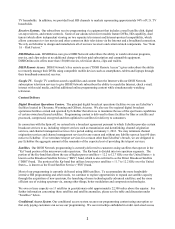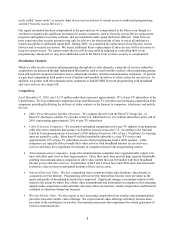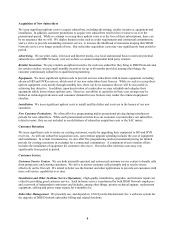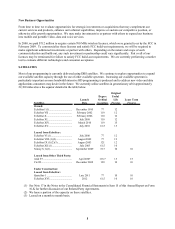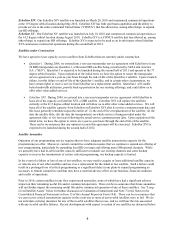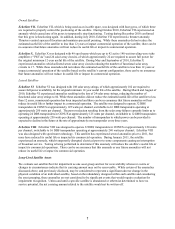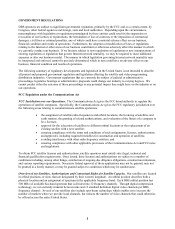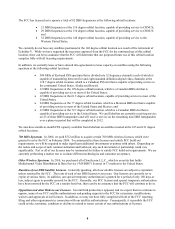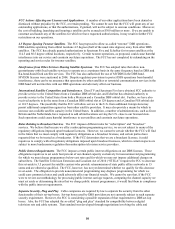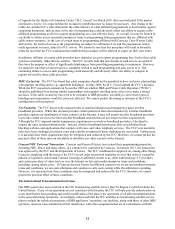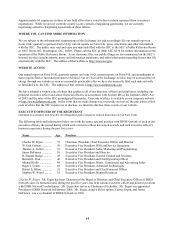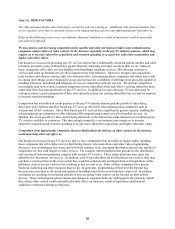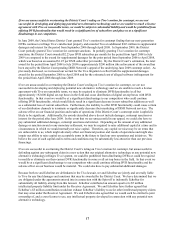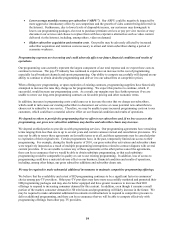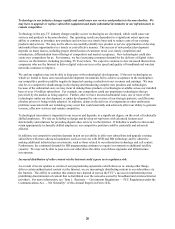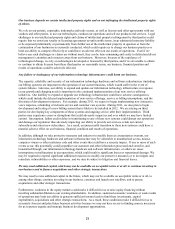Dish Network 2010 Annual Report Download - page 18
Download and view the complete annual report
Please find page 18 of the 2010 Dish Network annual report below. You can navigate through the pages in the report by either clicking on the pages listed below, or by using the keyword search tool below to find specific information within the annual report.11
11
consumer electronics industries, but not us. The FCC is considering various proposals to establish two-way digital
cable “plug and play” rules. That proceeding also asks about means to incorporate all pay-TV providers into its
“plug and play” rules. The cable industry and consumer electronics companies have reached a “tru2way”
commercial arrangement to resolve many of the outstanding issues in this docket. We cannot predict whether the
FCC will impose rules on our DBS operations that are based on cable system architectures or the private
cable/consumer electronics tru2way commercial arrangement. Complying with the separate security and other “plug
and play” requirements would require potentially costly modifications to our set-top boxes and operations. We
cannot predict the timing or outcome of this FCC proceeding.
Retransmission Consent. The Copyright Act generally gives satellite companies a statutory copyright license to
retransmit local broadcast channels by satellite back into the market from which they originated, subject to obtaining
the retransmission consent of local network stations that do not elect “must carry” status, as required by the
Communications Act. If we fail to reach retransmission consent agreements with such broadcasters, we cannot
carry their signals. This could have an adverse effect on our strategy to compete with cable and other satellite
companies that provide local signals. While we have been able to reach retransmission consent agreements with
most of these local network stations, there remain stations with which we have not been able to reach an agreement.
We cannot be sure that we will secure these agreements or that we will secure new agreements on acceptable terms
(or at all) upon the expiration of our current retransmission consent agreements, some of which are short-term. In
recent years, national broadcasters have used their ownership of certain local broadcast stations to attempt to require
us to carry additional cable programming in exchange for retransmission consent of their local broadcast stations.
These requirements may place constraints on available capacity on our satellites for other programming.
Furthermore, the rates we are charged for retransmitting local channels have been increasing. We may be unable to
pass these increased programming costs on to our customers, which could have a material adverse effect on our
financial condition and results of operations.
Digital HD Carry-One, Carry-All Requirement. To provide any full-power local broadcast signal in any market,
we are required to retransmit all qualifying broadcast signals in that market (“carry-one, carry-all”). The FCC has
adopted digital carriage rules that require DBS providers to phase in carry-one, carry-all obligations with respect to
the carriage of full-power broadcasters’ HD signals by February 2013 in markets in which DISH Network elects to
provide local channels in HD. In addition, STELA has imposed accelerated HD carriage requirements for
noncommercial educational stations on DBS providers that do not have a certain contractual relationship with a
certain number of such stations. DISH Network has entered into an agreement with a number of PBS stations to
comply with the requirements. DISH Network has also challenged the constitutionality of this provision but has not
prevailed in its effort to obtain temporary injunctive relief. The carriage of additional HD signals on our DBS
system could cause us to experience significant capacity constraints and prevent us from carrying additional popular
national programs and/or carrying those national programs in HD.
In addition, there is a pending rulemaking before the FCC regarding whether to require DBS providers to carry all
broadcast stations in a local market in both standard definition and HD if they carry any station in that market in
both standard definition and HD. If we were required to carry multiple versions of each broadcast station, we would
have to dedicate more of our finite satellite capacity to each broadcast station. We cannot predict the outcome or
timing of that rulemaking process.
Distant Signals. Pursuant to STELA, we have been able to obtain a waiver of a court injunction that previously
prevented us from retransmitting certain distant network signals under a statutory copyright license. Because of that
waiver, we may once again provide distant network signals to eligible subscribers. To qualify for that waiver, we
are required to provide local service in all 210 local markets in the U.S. on an ongoing basis. This condition poses a
significant strain on our capacity. Moreover, we may lose that waiver if we are found to have failed to provide local
service in any of the 210 local markets. If we lose the waiver, the injunction could be reinstated. Furthermore,
depending on the severity of the failure, we may also be subject to other sanctions, which may include, among other
things, damages. Our compliance with certain conditions for the waiver is subject to examination and review.
Dependence on Cable Act for Program Access. We purchase a large percentage of our programming from cable-
affiliated programmers. The provisions of the Cable Act of 1992, as amended (“Cable Act”), prohibiting exclusive
contracting practices with cable-affiliated programmers, were extended for another five-year period in September
2007. Cable companies appealed the FCC’s decision, and while that decision was upheld by the United States Court



